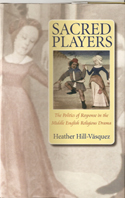Sacred players: the politics of response in the Middle English religious drama
 Sacred players: the politics of response in the Middle English religious drama
Sacred players: the politics of response in the Middle English religious drama
by Heather Hill-Vasquez
Offering a unique historical perspective to the study of medieval English drama, Heather Hill-Vásquez in Sacred Players argues that different treatments of audience and performance in the early drama indicate that the performance life of the drama may have continued well beyond its traditional placement in medieval history and into the Reformation and Renaissance eras. This historically expansive notion of the drama has several significant implications for the study of other religious drama also previously relegated to the English medieval period.
The idea that the drama could help determine both Protestant and Catholic devotional practice reveals the drama as a force that transcends medieval boundaries. Rather than documents preserving a fixed sacred meaning, extant manuscripts present texts wed closely to the inherent fluidity of performance, and to the flexibility of differing religious sensibilities. A consistently popular and powerful form of lay worship, the English religious drama previously seen as narrowly medieval in fact defined and reflected the varying nature of religious discourse and dramatic performance well into and beyond the Reformation.
Not only does Sacred Players explore this overlooked second life for the early drama, but it also argues that such a second life was driven by a focus on the role of audience response. Specifically, a politicizing of audience reception styles and devotional practices–a politicizing employed as Reformation polemic, influencing Eucharistic piety, and complicating the role of gender in worship–characterized much of the early English religious drama. Through its historically recursive and expansive approach to the early religious drama, Sacred Players examines previously unacknowledged and unexamined cultural forces that shaped the performance lifetime of these plays, and that promise to deepen our modern understanding of them.
